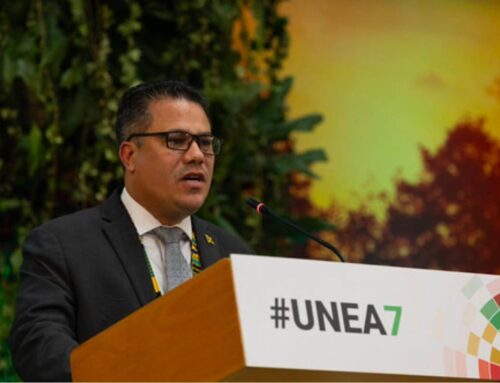A New Bill in Rhode Island Would Give Electric Ratepayers More Resources to Fight Back
March 28, 2025
The Rhode Island Public Utilities Commission on Friday voted to approve Rhode Island Energy’s proposed summer rates for residential customers, saying customers can expect relief following costly winter bills.
But the new rates have been met with such backlash by community members concerned about surging electric rates that state Rep. Megan Cotter has co-sponsored legislation that would fund customers’ participation in hearings about ratemaking and other issues before the RIPUC.
Earlier this month, during a public comment hearing for the proposed summer rates, residents packed the RIPUC office in Warwick. Before the meeting, protestors gathered outside, calling on commissioners and lawmakers to address the state’s rising energy costs.
Compared to 2017, energy bills this past winter for average customers in the state have nearly doubled, jumping from about $100 to $168. While summer rates will be lower, increases in distribution and transmission rates will keep prices unaffordable for many residents, protesters said.
The approved summer rates are the highest the state has seen in the past eight years—about $142 for an average residential customer.
Holding up signs which read “No more shut-offs” and “People over profit” during the protest, residents described even steeper increases, reporting energy bills skyrocketing from $100 to $400 in the span of only a couple of months.
Cotter, a Democrat who has made energy justice a signature issue, said customers’ reaction to the new rates is evidence of growing energy concerns.
Citing her experience door-knocking in her district last summer, Cotter said energy rates have been a consistent issue, especially for middle-class ratepayers. Despite not being eligible for low-income relief programs, energy rates for those residents have quickly become a significant burden, she said.
But community members continue to say those issues have gone unaddressed by the PUC.
“First of all, I’d like to thank you for having this meeting. It’s very important for your residents,” Warwick resident Catherine Zelazny said at the public hearing. “But I hope you people listen and not just have the meeting.”
Cotter said she was surprised by the “indifference” displayed by PUC members during the hearing. “People are upset; they don’t know how they’re going to make it,” she said. “Shut-off season is going to start on April 15. So, once April 15 hits, a lot of these folks are looking at being shut off.”
Part of the reason the new summer rates have been approved, despite public comments and protests, is that community members lack the necessary resources to get a seat in the rooms where decisions about their energy system are being made, said Emily Koo, senior policy advocate and Rhode Island program director at the Acadia Center, a nonprofit research and advocacy organization focusing on climate solutions.
That’s why Cotter, in partnership with the Acadia Center and the Conservation Law Foundation, introduced legislation to create an intervenor support program. The bill would enable individuals or organizations seeking legal representation to take part in evidentiary hearings at the RIPUC and the Energy Facility Siting Board.
“The resources, attorneys, and regulatory and technical knowledge that are needed to be able to participate and present evidence in a way that can actually change decisions is really an issue of access, and so we’re seeing decisions and proceedings not reflecting the public interest,” Koo said.
Unlike public comment hearings, evidentiary hearings work more like a courtroom, Koo explained. During those meetings, commissioners serve like a panel of judges, looking at proposals and evidence presented by the interested parties.
Both regulators and utility companies have “ready access to resources to engage in the legal process of reviewing utility proposals or rate cases,” said Jamie Rhodes, senior attorney at Conservation Law Foundation, “but the community that’s going to face the most direct impact doesn’t have access to resources unless they happen to have it on their own.”
“And that doesn’t meet, at least my personal fundamental understanding of equity and fairness,” he added.
The proposed intervenor support program would provide grants for residents or organizations that meet the legal requirements to serve as an intervenor in a case—for example, being directly impacted and not otherwise adequately represented—but that lack financial resources. To create the program, the bill identifies multiple potential funding sources, including the state’s budget.
“To me, this is the most fair way of doing it,” said Rhodes. “I could imagine the program being done for $200,000 to $500,000 a year, so we’re not talking about a huge budget hit.”
He and other advocates say there is ample evidence that meaningful change has been achieved through intervention. Just last year, after Rhode Island Energy over collected about $24 million from residential customers due to accounting errors, low-income residents, represented by The George Wiley Center, intervened in the case, arguing that low-income customers should receive higher payments to account for the disproportionate burden they faced. The proposal was successful, and low-income ratepayers received a refund of $140, about double the $68 received by other residential customers.
Rhode Island customers are also worried about how renewable energy is impacting their bills. The current Rhode Island Energy proposal includes an extra 25 cents per month to cover costs related to the state’s renewable energy requirements. Last year, a Green Development proposal to build a solar farm in Johnston was rejected by the town’s zoning board after years of opposition from residents.
By including the Energy Facility Siting Board, the proposed intervenor support program would also provide resources to those hoping to intervene in cases related to solar and other energy infrastructure development.
When asked if the program could, in some cases, challenge Rhode Island’s renewable goals, by making solar energy harder to develop, Rhodes said: “We’ve tried to draft this program that is agnostic, and it’s trying to center the experience of impacted individuals … If somebody is going to be directly impacted by a solar farm, well, they should also have the right to be heard on what that impact is going to be.”
The proposed intervenor support program follows similar efforts in neighboring states, including Maine and Connecticut. Massachusetts included the creation of a similar program as part of its 2024 climate bill.
“We started with an idea that’s been working in other states, and the process now is to figure out how we adapt it to Rhode Island,” Rhodes said. “The legislative process allows that feedback to come forward.”
The bill, introduced last month, has been held for future study by the House. As drafted, the bill says the support program would take effect in September.
This story is funded by readers like you.
Our nonprofit newsroom provides award-winning climate coverage free of charge and advertising. We rely on donations from readers like you to keep going. Please donate now to support our work.
Koo is optimistic that the bill will eventually pass in the state. “I think that there is a lot of appetite for engaging in the regulatory process, and that this is a really great inclusive program option,” she said.
According to Cotter, the intervenor support program is just the first step of a much longer fight to repair Rhode Island’s energy system. Other bills sponsored by Cotter include capping Rhode Island Energy’s profit at 5 percent—it’s currently capped at about 9 percent—and studying the possibility of a state-run utility.
“I think we need an overhaul of the PUC,” she said.
Cotter would also like to add a position for a low-income home energy assistance program representative in the PUC. “I think we need to add someone who understands the difficult decisions that a lot of Rhode Islanders are making right now,” she said. “Are they putting food on their table? Are they paying their utilities? Are they buying insulin, or are they putting gas in their car?”
While Cotter’s proposals would mean a complete reassessment of Rhode Island’s energy regulation, she is confident that they are necessary to finally address one of the main challenges facing residents in the state.
“I think as a state, we need to put our money where our mouth is,” Cotter said. “If we’re not looking forward, then we’re just never going to solve it.”
About This Story
Perhaps you noticed: This story, like all the news we publish, is free to read. That’s because Inside Climate News is a 501c3 nonprofit organization. We do not charge a subscription fee, lock our news behind a paywall, or clutter our website with ads. We make our news on climate and the environment freely available to you and anyone who wants it.
That’s not all. We also share our news for free with scores of other media organizations around the country. Many of them can’t afford to do environmental journalism of their own. We’ve built bureaus from coast to coast to report local stories, collaborate with local newsrooms and co-publish articles so that this vital work is shared as widely as possible.
Two of us launched ICN in 2007. Six years later we earned a Pulitzer Prize for National Reporting, and now we run the oldest and largest dedicated climate newsroom in the nation. We tell the story in all its complexity. We hold polluters accountable. We expose environmental injustice. We debunk misinformation. We scrutinize solutions and inspire action.
Donations from readers like you fund every aspect of what we do. If you don’t already, will you support our ongoing work, our reporting on the biggest crisis facing our planet, and help us reach even more readers in more places?
Please take a moment to make a tax-deductible donation. Every one of them makes a difference.
Thank you,
Search
RECENT PRESS RELEASES
Related Post



